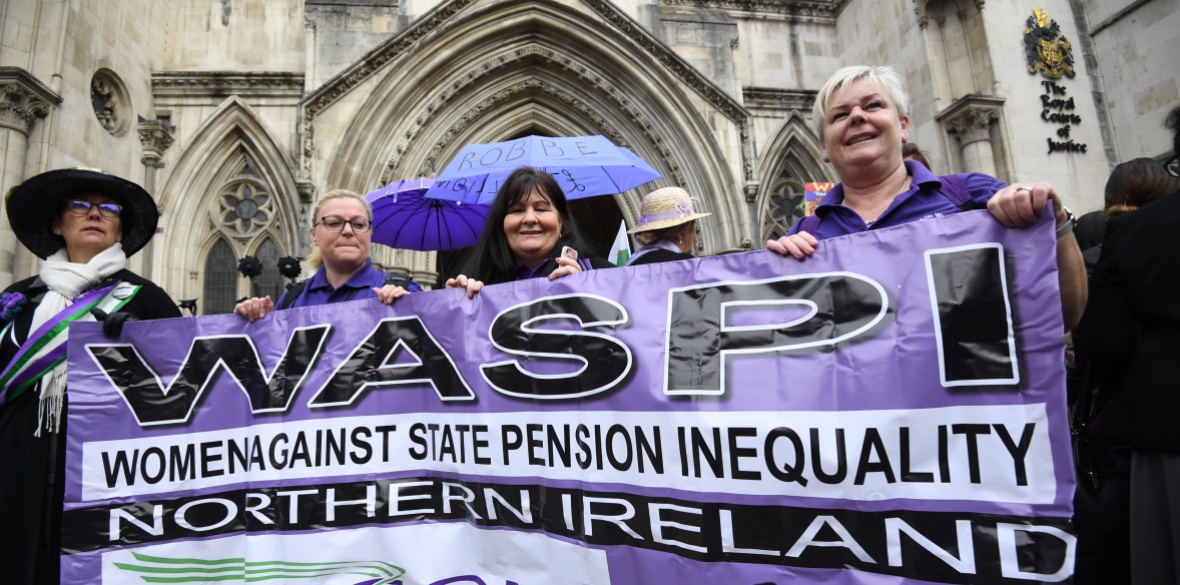This is the last article you can read this month
You can read more article this month
You can read more articles this month
Sorry your limit is up for this month
Reset on:
Please help support the Morning Star by subscribing here
WHEN Labour included proposals in its manifesto to help the Waspi women (Women Against State Pension Increases), spokesperson of the campaign group “We Paid In, You Pay Out” Trudy Baddams said: “At last we were being taken seriously, our voices had been heard, Labour were listening to us, the newspapers were listening to us.” She paused. “Our group finally had hope.”
As the proposals were fleshed out, both Jeremy Corbyn and John McDonnell talked of “righting an historic wrong.” The party included an online calculator so the women affected could work out what they would be entitled to if Labour was elected.
Although there was a lot of criticism levelled at Labour’s proposals, they stood their ground, certain that the issue of the state pension age for women born in the 1950s was one of fairness — of doing the right thing.
The problem was created when the Conservative government increased the state-pension age, which became law in 1995. There was a lack of publicity, bar the odd article buried in the Times and Financial Times, which the majority of women missed.
The first time, therefore, that many of the women knew about the pension-age increase was when they were nearing retirement at their expected age of 60.
“It was incredibly unfair,” Baddams said. “It gave us no chance to make alternative arrangements in order to choose when we could retire. We were left to simply cope with no pension for what in 2011 became six years. We will be out of pocket by over £40,000 by the time we reach the new pension age of 66.”
The point of the government’s reforms in 1995 was to make equal the pension age between the sexes, which for women meant their pension age was increased. The government felt this solved the inbuilt discrimination in the pension system.
But for women for whom workplace inequality meant lower earnings and pension contributions or who, in the majority of cases needed to take time off to look after children and care for other family members and were not eligible for occupational pensions or able to afford private ones, it was a disaster.
It has been a long campaign to get these issues the national attention they deserved as the press were slow to cover it, despite the millions of women affected. It is only by the sheer force of these women uniting, taking to the streets, and utilising all types of media that their plight was moved up the news agenda.
For example, the campaign We Paid in, You Pay Out, which has over 9,500 members, organised rallies and created their own paperback book of over 300 personal stories, which was reviewed at The Morning Star https://morningstaronline.co.uk/article/grim-price-rise-state-pension-age-women.
A video of the Back to 60 “One Voice” rally (which brought together all the campaign groups) and stopped the traffic in Parliament Square has been viewed and shared countless times. They even had two hits that reached number one in the Amazon charts, specifically for the cause.
As the night of the election arrived, Baddams says, many of their members watched as strong Labour seats turned blue for the first time in decades.
“We were sharing our thoughts and information. Then as the horror of the situation began to emerge, administrators of the group received messages of total despair, fear and even thoughts about suicide, which meant they had to offer not only support but also post details for the Samaritans and other helplines.”
The reason so many women felt hopeless was due to statements made during the election campaign by the Conservatives that dismissed helping these women using the proposals put forward by Labour, declaring them as unworkable and far too expensive.
There is a tangible fear for the future, Baddams says: “Many women are dependent on the cruel benefit system this Conservative government has created, such as universal credit with the inbuilt long five-week delay for benefits, the grossly unfair bedroom tax, inexplicable sanctions and the awful fit-for-work and PIP assessments specifically designed to fail claimants, which inevitably means waiting months for a tribunal decision in front of a judge.
“As a direct result women in their 60s are forced to attend food-banks.”
Baddams argues that it’s not expensive to resolve this issue, nor is it the responsibility of the taxpayer or young to fund it, as it has already been paid by these women in the form of national insurance.
The government has stripped the National Insurance Fund of its surplus, which is now sitting in the National Insurance Investment Fund, which can be used to bring down national debt.
“This money used to be ringfenced,” Baddams says. “The Treasury used to contribute to the fund too. So, it is a case of pay-back not pay-out.”
When Boris Johnson was campaigning to be leader of the Conservatives, he said he would look at the issue with “fresh eyes” — though he has a track record of dishonesty. During the election campaign he claimed his refusal to right the wrong was an indication of his honesty with the public.
Still, some 3.4 million women will be doing all they can to ensure he acts, and that includes using the law.
Back to 60, on behalf of all women affected, are taking the DWP to court with the help of Michael Mansfield QC and are currently waiting for an appeal.
These women are demanding action from the government to alleviate this unfair financial and psychological burden. The fight for justice goes on.
We Paid In You Pay Out can be found on Twitter @wepaidinupayout Back to 60 can be found at https://www.backto60.com.
R. F. Hunt is a freelance journalist and an author.









